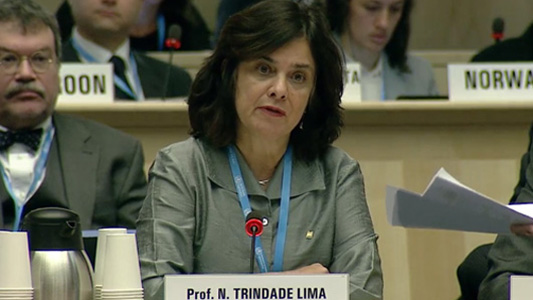Fiocruz President highlights "neglected populations" at WHO conference

02/05/2017
André Costa (CCS)
At a meeting at the World Health Organization (WHO) headquarters in Geneva on Wednesday (April 19), the president of Fiocruz, Nísia Trindade Lima, said that it is necessary to "think of neglected populations, not just neglected diseases". According to Lima, "the health sector needs to work in coordination with other sectors, ensuring free access to quality services that lead to health promotion and education."
The statement was made at the Global Partners Meeting on Neglected Tropical Diseases. Collaborate. Accelerate. Eliminate.which brought together dozens of international leaders, diplomats, researchers, industry representatives, members of non-governmental organizations (NGOs), among other stakeholders in the issue of neglected tropical diseases.
Lima composed two panels of the event. At the opening table, she said that "we have to think about the relationship between the public and the health sector as a win-win game. We collaborate in many areas in terms of research for innovation, and only by doing that we will achieve the goal of this meeting of 'collaborating, accelerating and eliminating’ neglected tropical diseases.”
In addition to Lima, the panel included, among others, the entrepreneur and philanthropist Bill Gates, the former UN Secretary-General Kofi Annan, and the WHO Director-General Margaret Chan. Chan hailed Lima as "the first woman to preside the important Oswaldo Cruz Foundation."
In her second participation, the Fiocruz president underscored the importance of vector control to fight against neglected tropical diseases, Lima said that "it is always necessary to remember the social and environmental determinants of health. Brazil has had dengue outbreaks for 30 years, and this is directly related to the rapid urbanization in the country without the necessary sanitation conditions.” According to her, to solve this situation, "as in other complex problems, there is not only one solution. We need to improve the sanitation conditions, the most important aspect, and also to pursue new technologies for vector control such as the Wolbachia bacteria, which Fiocruz develops in partnership with the Gates Foundation."
In addition to this meeting, Lima gathered with directors of WHO departments and programs on neglected tropical diseases. The importance of Brazil in global health, innovations for neglected tropical diseases, and the importance of health education programs and open access to knowledge were discussed.
The meeting also included the launch of the WHO Fourth Report on Neglected Tropical Diseases, which marks ten years of systematic efforts made by the international organization to fight against NTDs. The WHO states that, because of them, one billion people who would otherwise be unassisted have received treatment only in 2015.
According to WHO, the document
"demonstrates how strong political support, generous donations of medicines, and improvements in living conditions have led to sustained expansion of disease control programmes in countries where these diseases are most prevalent. Since 2007, when a group of global partners met to agree to tackle NTDs together, a variety of local and international partners have worked alongside ministries of health in endemic countries to deliver quality-assured medicines, and provide people with care and long-term management."
The Director-General of the WHO welcomed the report findings. “WHO has observed record-breaking progress towards bringing ancient scourges like sleeping sickness and elephantiasis to their knees,” said Dr Margaret Chan. “Over the past 10 years, millions of people have been rescued from disability and poverty, thanks to one of the most effective global partnerships in modern public health.”
The recordings of the two panels that Lima participated in, as well as the other discussions of the meeting, can be watched here. Check also the interview that Nísia gave to the UN (in Portuguese).


